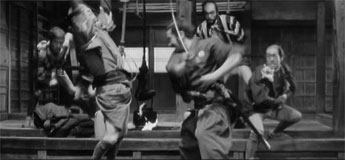
Director:
Akira Kurosawa
Starring:
Toshiro Mifune
Tatsuya Nakadai
Takashi Shimura
Akira Kurosawa's Yojimbo, the film which spawned the iconic Fistful of Dollars as well as a number of other works, contains everything a great film should have. It can be viewed and enjoyed on a completely aesthetic level, but it is at heart a true example of great filmmaking, showcasing one of the best of many collaborations of legendary talents Akira Kurosawa and Toshiro Mifune in their prime. And though its story was told and re-told across years and continents, its wit and attitude remain distinct to this day — truly a testament to the film's timeless qualities.
The film, set in 1860 after the fall of the Tokugawa dynasty, follows a nameless ronin who goes by the self-given name Sanjuro (Roughly translated as "fourty-ish.") He wanders into a gang-run town and decides to make a living by killing in a town full of people who need killing. And he is the perfect man for the job, given his extreme skills, appropriate for a story unabashedly told in terms of extreme good and extreme evil.
Mifune's Sanjuro enters the film with just as much presence as when he leaves it and never loses it for a moment, communicating the character's unusual personality even with his back turned to us. Smoothly making the transitions between laid-back disinterest and barbaric intensity, Mifune demonstrates his versatility, creating his character with minimalist chin brushes and squints to counterbalance his trademark throaty growl. It's his small quirks, his graceful gracelessness that distinguishes Sanjuro from the many action heroes of today. His charm, unlike that of so many imitators, isn't buried below the film's body count, and is instrumental in the film's tounge-in-cheek mood.
Shot by Rashomon cinematographer Kazuo Miyagawa, the film visually and thematically recalls the John Ford westerns which Kurosawa cites as one of his great influences as a filmmaker. The isolated feudal Japanese town plays to the established connotations of the untamed west. However, the artistry with which all the actions on screen are handled is all Kurosawa. Every frame is composed as if it were a painting, making what other directors would address as simple movements as walking down stairs or a chaotic sword fight into visual artistry.
As was what seemed to be the theme of Kurosawa's career, humanism and the power of the individual in a world of overpowering evil are central to the situation that plays out in Yojimbo. In a quote taken from the 1999 book The Films of Akira Kurosawa by Donald Richie and repeated in the booklet included in the recent Criterion re-release of the DVD, Kurosawa says "I've always wanted to somehow or other stop these senseless battles of bad against bad, but we're all more or less weak — I've never been able to. And that is why the hero of this picture is different from us. He is able to stand squarely in the middle and stop the fight. And it is — him — that I thought of first. That was the beginning of the film in my mind." What Yojimbo represents to Kurosawa is a world where conflict is erased by an idealization of a power that can make the world quiet and peaceful again, like rain to a drought. It's utter fantasy, but a fantasy in the hands of a master auteur like Akira Kurosawa is just the right material for a masterpiece.
Five Thumbs Up





No comments:
Post a Comment